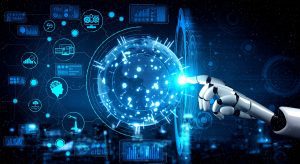In the rapidly evolving landscape of technology, Artificial Intelligence (AI) has emerged as a transformative force with the potential to redefine how we live, work, and interact. This article aims to provide a comprehensive overview of what Artificial Intelligence is and its various facets.
Defining AI
Artificial Intelligence refers to the development of computer systems that can perform tasks that typically require human intelligence. These tasks include learning, reasoning, problem-solving, understanding natural language, and perception.
Types of AI
- Narrow or Weak AI: This type of AI is designed to perform a specific task, such as virtual personal assistants or image recognition.
- General or Strong AI: This represents a more advanced form of AI that possesses the ability to understand, learn, and apply knowledge across diverse domains, similar to human intelligence.
Machine Learning and AI
Machine Learning (ML) is a subset of AI that focuses on enabling machines to learn from data without explicit programming. It plays a crucial role in enhancing the capabilities of AI systems by allowing them to improve their performance over time.
Deep Learning
Deep Learning is a subset of ML that utilizes neural networks to simulate human-like decision-making. It has been instrumental in achieving significant breakthroughs in tasks such as image and speech recognition.
Natural Language Processing (NLP)
NLP is another critical aspect of AI, enabling machines to understand, interpret, and generate human-like text. Applications include language translation, chatbots, and sentiment analysis.
Real-world Applications
AI is making a profound impact across various industries, including healthcare, finance, education, and entertainment. Examples range from medical diagnostics and financial fraud detection to personalized learning platforms and recommendation systems.
Challenges and Ethical Considerations
As AI continues to advance, concerns about privacy, bias in algorithms, and the potential impact on employment have become subjects of intense debate. It is crucial to address these challenges responsibly to ensure the ethical development and deployment of AI technologies.
Conclusion
In conclusion, Artificial Intelligence represents a fascinating journey into the realm of machines that can emulate human intelligence. As we explore the possibilities and applications of AI, it is essential to approach its development with a mindful consideration of ethical implications and societal impact.
This article serves as a starting point for those seeking to understand the fundamental concepts of AI. More articles are on the way!
Enroll to our course on Udemy, titled “AI Essentials: A Beginner’s Guide to Artificial Intelligence” and unlock the power of AI in your endeavors!

Featured Online Courses:
- AI Essentials: A Beginner’s Guide to Artificial Intelligence
- Human-AI Synergy: Teams and Collaborative Intelligence
- Working with Python on Windows and SQL Server Databases
- Introduction to Computer Programming for Beginners
- Data Management for Beginners – Main Principles
Check Also:
- Welcome to the GnoelixiAI Hub!
- What is Machine Learning?
- The Role of Databases in AI Applications
- Graph Databases and AI: Unlocking Synergy for Innovation
- Beyond Boundaries: Exploring Human-AI Teams Synergy
- What is Collaborative Intelligence (AI)?
- Deep Learning Explained
- Memory Safeguarding: Ensuring Continuity in AI Systems
Rate this article:
Reference: GnoelixiAI.com (https://www.gnoelixiai.com)
© GnoelixiAI Hub
Artemakis Artemiou, a distinguished Senior Database and Software Architect, brings over 20 years of expertise to the IT industry. A Certified Database, Cloud, and AI professional, he earned the Microsoft Data Platform MVP title for nine consecutive years (2009-2018). As the founder of SQLNetHub and GnoelixiAI Hub, Artemakis is dedicated to sharing his knowledge and democratizing education on various fields such as: Databases, Cloud, AI, and Software Development. His commitment to simplicity and knowledge sharing defines his impactful presence in the tech community.

